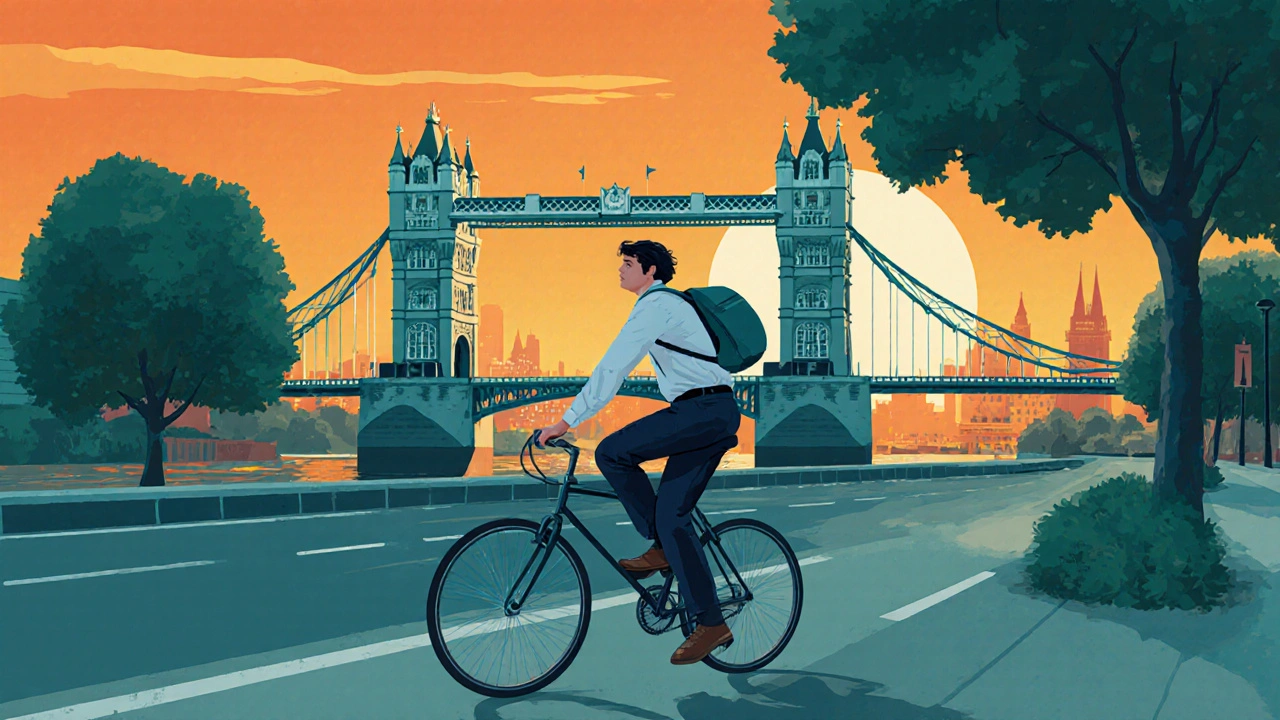London’s work-life balance is broken - but you can fix it
You wake up at 6:30 a.m., squeeze onto the 7:15 Northern Line train, and arrive at your desk by 8:45. You don’t leave until 7 p.m. - maybe later, if a Slack message pops up at 8:30. By the time you get home, it’s 9:15. You eat, scroll, collapse. Rinse. Repeat. This isn’t dedication. This is survival. And it’s the norm for too many people in London.
London doesn’t pay you enough to live well. It doesn’t give you enough time to breathe. But it does give you tools - if you know how to use them.
Work-life balance here isn’t about working less. It’s about working smarter. It’s about controlling your commute, not letting it control you. It’s about saying no - clearly, calmly, and often.
Your commute is stealing your life - here’s how to take it back
The average Londoner spends 72 minutes commuting each day. That’s over 8 hours a week. 350 hours a year. Nearly nine full workdays. And most of that time is spent standing, stressed, and silent.
But you don’t have to accept it.
First, map your commute. Not just the route - the cost. Time. Money. Mental energy. Use Citymapper or Google Maps to compare options. Try leaving 15 minutes earlier or later. The 7:45 train might be 10 minutes slower, but it’s 30% less crowded. That’s worth it if it lets you breathe.
Some people switch to cycling. London’s cycle superhighways are better than they were five years ago. TfL’s Santander Cycles are everywhere, and the £2.20 daily cap makes it cheaper than a Tube ticket. You’ll arrive energized, not drained.
Others work from home two days a week. If your job allows it, negotiate it. Not as a perk - as a productivity tool. A 2024 study by the London School of Economics found remote workers in London reported 22% higher focus and 31% lower stress levels on hybrid days.
And if you’re stuck on public transport? Turn it into your time. Listen to a podcast you love. Call a friend. Don’t scroll. Don’t check emails. Let your brain reset.
Setting boundaries isn’t rude - it’s necessary
Here’s the truth: if you don’t set boundaries, your boss, your coworkers, and your own guilt will set them for you. And they’ll choose the worst possible ones.
Start with your hours. Write them down. Post them on Slack. Tell your team: “I’m available 9-6, Monday to Friday. Outside that, I’m offline unless it’s an emergency.” Then stick to it.
“Emergency” means the server just crashed. Not “Can you just quickly review this?” That’s not an emergency. That’s poor planning.
Turn off notifications after hours. Use Focus Mode on your phone. Put your laptop in another room. If you’re still checking emails at midnight, you’re not being productive - you’re being exploited.
And don’t apologize for it. You’re not being uncooperative. You’re protecting your mental health. And your long-term performance.
One marketing manager I spoke with started replying to after-hours messages with: “I’ll get to this tomorrow morning.” No excuses. No emojis. Just a clear, calm boundary. Within three weeks, the volume of late-night emails dropped by 60%.

London’s culture pushes you to overwork - don’t let it win
There’s a myth in London that being busy equals being valuable. That staying late means you’re committed. That saying no means you’re not a team player.
It’s all nonsense.
Companies that value output over hours know this. They measure results, not screen time. But even in those places, the pressure to perform - to look busy - is real.
So change the culture around you. Leave at 6 p.m. regularly. Don’t wait for permission. When someone says, “You’re leaving already?” reply with, “Yep. Got a plan for tonight. How about you?”
Be the person who’s calm, consistent, and reliable. Not the one who’s always online.
And if your manager praises you for working late? Say thank you - then add: “I’m aiming to deliver the same results in standard hours. Let me know if you’d like to see how I’m structuring my time.”
That shifts the conversation from hours to outcomes.
Use your weekends - not just to rest, but to rebuild
Weekends aren’t just for sleeping in. They’re for reconnecting with your life outside work.
Plan one thing you love every weekend. It doesn’t have to be big. Walk in Richmond Park. Cook a meal from scratch. Visit a free gallery. Call your mum. Read a book that has nothing to do with your job.
London has more free museums than any city in Europe. The Tate Modern, the British Museum, the National Gallery - all open daily, all free. Use them. Not as a tourist. As a person who needs to remember there’s more to life than KPIs.
And if you’re tired of being alone? Join a club. A book group. A running circle. A pottery class. The London Community Centre runs low-cost weekly activities for people who just want to connect without the pressure of networking.
These aren’t luxuries. They’re your reset button.

What happens when you stop sacrificing yourself
When you start protecting your time, things change.
You sleep better. You stop dreading Mondays. You actually enjoy your weekends. Your creativity comes back. You start noticing small things - the way the light hits the Thames at sunset, the smell of fresh bread from the corner bakery.
And your work? It gets better.
People notice. They ask how you’re so calm. They copy your habits. Slowly, quietly, you become the example.
Work-life balance in London isn’t about escaping the city. It’s about reclaiming your days from the system that wants you to burn out.
You don’t need a bigger salary. You need better boundaries. Better commute choices. And the courage to say: “I’m not available.”
Frequently Asked Questions
Is it possible to have work-life balance in London if I work in finance or law?
Yes - but it takes more planning. Finance and law firms are notorious for long hours, but even there, boundaries work. Start small: block your calendar for lunch. Don’t answer emails after 8 p.m. Use your commute to decompress, not to prep for tomorrow. Many junior lawyers and analysts in London now negotiate “core hours” - 10 a.m. to 6 p.m. - and deliver results within that window. It’s not the norm yet, but it’s becoming more common.
How much does commuting cost in London each month?
It depends. A monthly Zone 1-2 Travelcard costs £149.40. If you’re commuting from Zone 4, it’s £217.80. Add in cycling costs - a decent bike is £300-£600 upfront, but you’ll save £150-£200 a month on transport. If you work from home two days a week, you can cut your monthly travel costs by 40%. That’s £60-£90 back in your pocket - enough for a weekend trip or a massage.
What if my job requires me to be on call?
Even on-call roles can have boundaries. Define what “on call” means. Is it phone calls only? Or do you need to respond to Slack? Can you be on call one weekend a month instead of every week? Negotiate the terms. If your employer expects 24/7 availability without extra pay, that’s not sustainable - and it’s often illegal under UK employment law. You’re entitled to rest periods. Use them.
How do I say no without sounding unprofessional?
Use this formula: “I can’t take this on right now, but I can help with X instead.” For example: “I can’t review this report tonight - I’ve got a family commitment. But I can look at it first thing tomorrow and give you detailed feedback by 10 a.m.” You’re not refusing. You’re redirecting. And you’re showing you’re still reliable.
What if my manager says I’m not a team player for leaving on time?
Ask them: “What does being a team player mean to you?” If they say “staying late,” challenge it. “I deliver all my deadlines on time. I’m available during core hours. Is there a specific project where my output is lacking?” Most managers will realize they’re judging presence, not performance. If they still push back? That’s a red flag about the culture - not your behavior.
Next steps: Start small, but start today
Don’t try to overhaul your life tomorrow. Pick one thing.
- Try leaving work 15 minutes earlier this week.
- Turn off email notifications after 7 p.m.
- Map your commute and find one alternative route.
- Block one Saturday morning for something that has nothing to do with work.
Do that. Then do it again next week.
Work-life balance isn’t a destination. It’s a daily practice. And in London, the most radical thing you can do is choose yourself - again and again.
